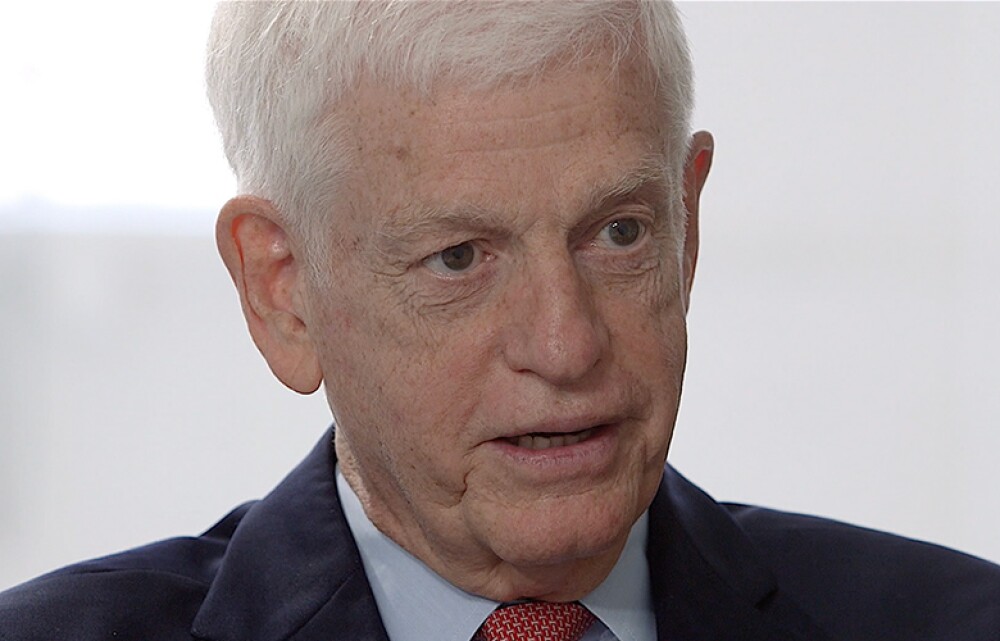To spend 30 minutes in conversation with stock-picking icon Mario Gabelli is an intense experience. The 75-year-old founder and CEO of Gamco Investors speaks with a rapid-fire delivery and dives quickly into the weeds of subjects that he addresses. He initially meets questions with a scowl or a frown, though he answers every one amiably.
We meet outside of a Deutsche Bank media conference he is attending at The Breakers, the famed luxury hotel in Palm Beach, Florida. Pointing to the ten-foot ocean swells outside a nearby window, he makes an interesting comparison. Just as no one had seen waves that big in Palm Beach for a while, no one had seen a 10 percent drop in stocks and a spike in volatility for a while before February. But both are normal events, Gabelli points out. The stock correction was “long overdue,” he says.
When I first encounter him at The Breakers, Gabelli is speaking with his long-time friend Leon Cooperman, legendary founder of the hedge fund firm Omega Advisors. After a quick fist-bump with his old buddy, Gabelli and I are off for our conversation. He looks more like a junior analyst — with a rumpled suit, arms full of papers and a genial smile — than the billionaire investor who earned the nickname “Super Mario,” after a 1980s video game character.
Gabelli, who set up his first business at the age of six, shining shoes at a New York City subway station, certainly thinks long-term. He often takes years getting to know executives at a company before he will invest in it.
Perhaps that’s why Gabelli, who still spends much of his time reading earnings-call transcripts, isn’t too worried about the trend toward passive investing that has robbed active-management firms like his of assets.
“Passive investment makes sense if an investor wants a long-term, efficient way to invest in the S&P 500 and they don’t have much knowledge,” he says.
And Gamco’s active management style has paid off for investors, he notes, with a compound annualized return of 15.3 percent for its institutional and private wealth management accounts since the firm’s founding in 1977.
Gabelli calls himself a bottom-up stock picker, and he mentioned several industries and companies that he finds attractive now. One is the so-called companion-pet sector - marketspeak for household pets.
He originally got interested in the sector 30 years ago when researching Hartz Mountain Corp., then a major pet products company. Thirty years later, Gamco has invested in several pet-related companies. That includes Blue Buffalo Co., which makes dog and cat food, and veterinary-facility owner VCA (ticker: WOOF). Gamco has even filed a preliminary prospectus with the Securities and Exchange Commission for a pet-focused exchange-traded managed fund: Gabelli Pet Parent Nextshares.
Another sector Gabelli likes is housing. “It has a long runway — still three to five years,” he says. Supply is low, and demand from millennials is starting to percolate. Gabelli recommends Lennar, the nation’s second largest homebuilder.
And what of the media sector - the focus of the conference Gabelli attended at The Breakers? The main issues are delivering content directly to consumers, a la carte pricing for that content, and globalization, he says.
“The underlying background noise at the conference was consolidation in media because of the tech giants: Amazon, Facebook and Apple,” Gabelli says. The tech companies are trying to figure out how to monetize their data in the media sector, he says. (This conversation took place before the recent brouhaha over Facebook’s use of data. But that simply highlights the issue.)
He expressed an interesting thought about Amazon founder Jeff Bezos, comparing him to a business legend of the early 20th century. “The notion of Henry Ford when he introduced the assembly line is clearly what Bezos is doing,” Gabelli says. “Your gross profit is my appetizer.” Clearly Amazon has an assembly line of its own.
As you can guess from his earlier comments about the waves outside The Breakers, Gabelli isn’t too worried about rising interest rates, a possible increase in inflation, and the potential of a trade war.
“The big issue is our $500 billion trade deficit, the $1 trillion budget deficit, the $20 trillion national debt, an aging population, and not a lot of companies starting up, says Gabelli, who is prone to rattling off relevant statistics on a wide variety of topics.
So are those the issues that worry him? “Everything worries me,” he immediately responds. “If I don’t worry, I don’t get paid.”
But Gabelli likes to put things in perspective. “We’ve studied the last 100 years, so we’ve seen it all,” he says. “The system has survived two world wars, and I think it will survive another 100 years. The problem is my clients don’t think in terms of 100 years.”







